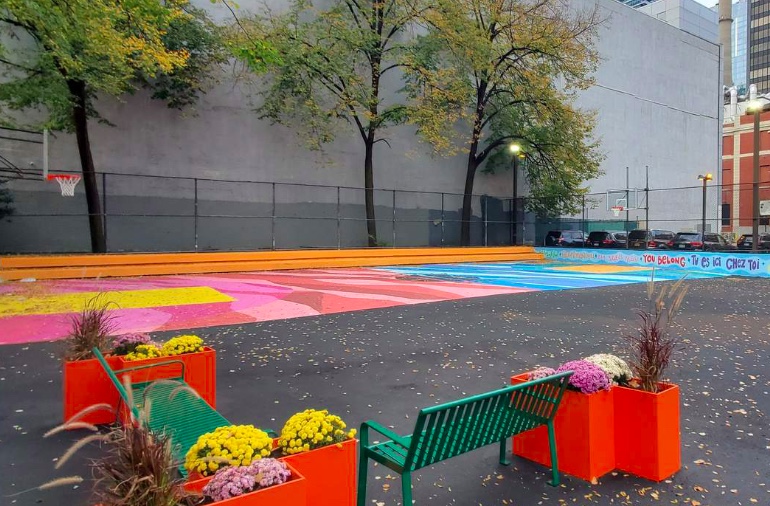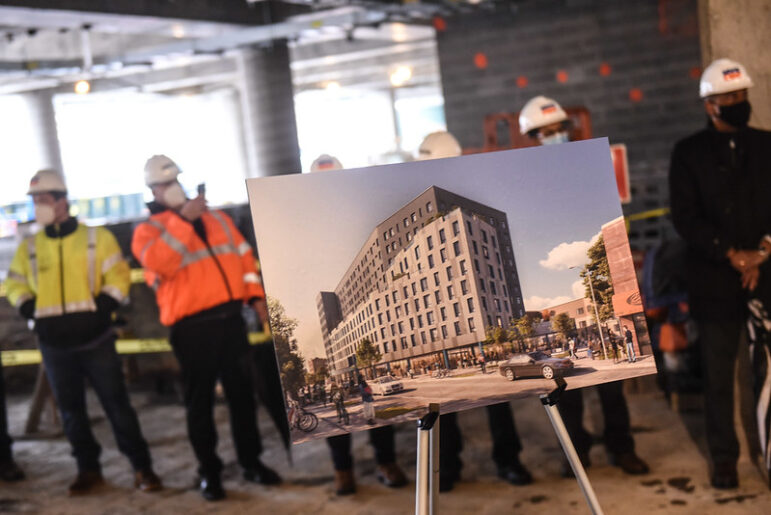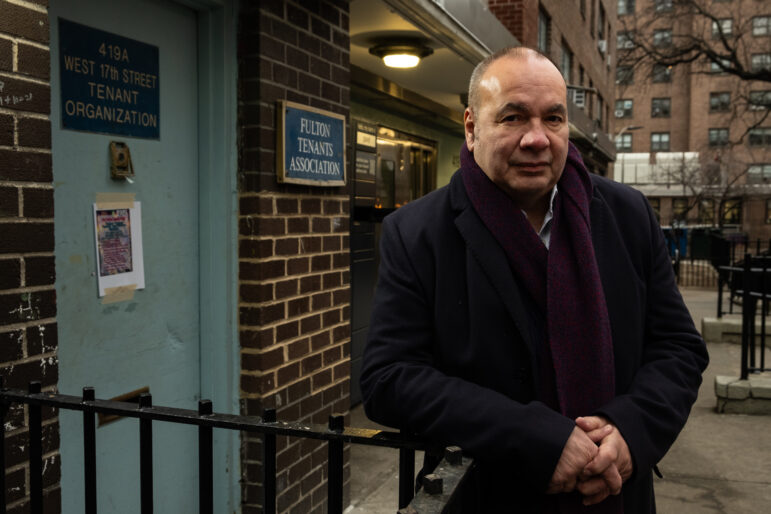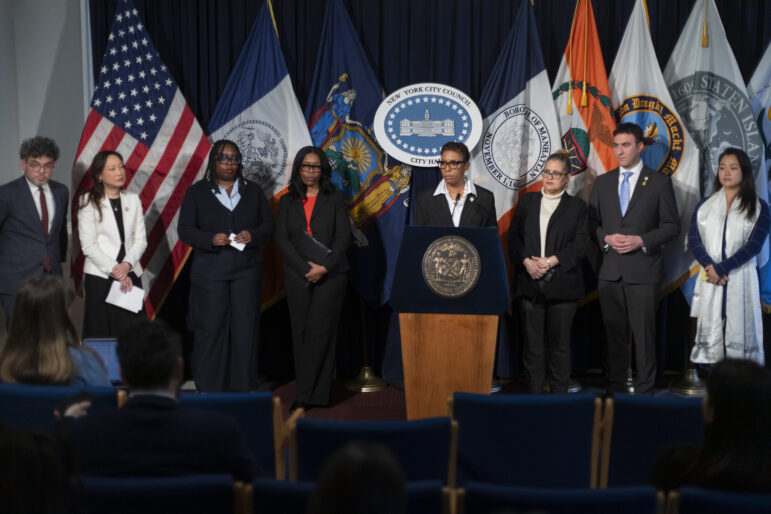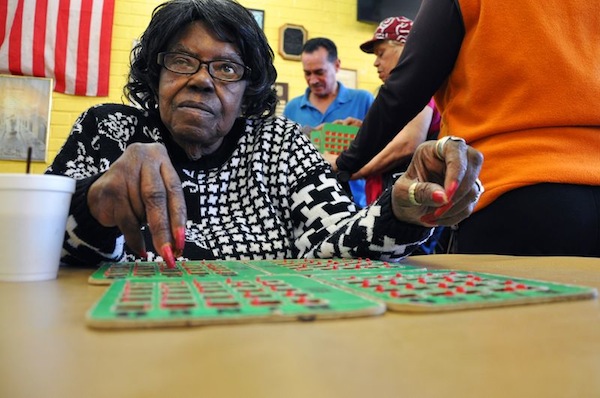
Photo by: Kirsti Itameri for MetroFocus
Neither a vigorous exercise class nor a congressman’s visit could stop the Bingo game at the Van Dyke Senior Center on Friday, April 5.
This article is an installment in The Five Borough Ballot, a collaboration between City Limits, City & State and WNET’s MetroFocus. In each edition of the print and video series, we return to a location in each of the five boroughs to ask real New Yorkers their take on the 2013 election as it unfolds. For a complete overview of the series, go here
As he smokes a cigarette outside the senior center on the edge of the massive Van Dyke Houses development in Brownsville in early April, stealing is on Angelo’s mind.
“Why is there only one garbage can there?” asks Angelo, a Latino man in his 40s wearing a Yankees cap and clutching a rubber ball in his non-cigarette hand. He points to the garbage-laced metal fence around the patio next to where he was standing. He means this as a critique of the people running the Van Dyke complex for the New York City Housing Authority. Sort of.
“But at the same time, when they put out more garbage cans, the guys steal them and sell them for scrap metal,” he says. “Yeah. Really. So people complain, ‘In the suburbs, they don’t have just one garbage can!’ And I say, ‘Yeah, but in the suburbs, people don’t steal the garbage cans either.'”
A couple days earlier, the papers had carried allegations of a different kind of theft: State Sen. Malcolm Smith and City Councilman Daniel Halloran had been arrested on charges they conspired to attempt to bribe Smith into the Republican mayoral primary.
They’re just allegations at this point, but the general reaction at Van Dyke is not one of surprise. People there are used to thieves, whether they sit in high office or, as many elderly residents fear, lay in wait in the elevators on the days people cash their Social Security checks.
Still, some take the scandal personally, like Geraldine Jenkins, who has lived at Van Dyke for 50 years. “I don’t think it’s fair for them to treat us like that,” she says.
Inside the senior center, lunch is fish and French fries. As the meal wraps up, a hyper-energetic physical trainer going by the nickname “Chico Malo” (or “Bad Boy”) recruits a dozen seniors to do calisthenics at the front of the room as dance music pulsates from a far corner. The almost exclusively female crowd pumps their biceps and works their quads. “Are you weak?” Chico Malo shouts. “No!” they shout back. “Are you weak?!”
“No!!”
One diner who was surprised by the Smith-Halloran scandal was Lisa Kenner, the head of the resident association for the 22-building development. She has met Smith and liked him. As a former Democratic district leader, Kenner is unusually engaged in politics—a couple months back she took the train into Manhattan to see an Independence Party forum, just to stay abreast of what was said there. That proximity to politics has made her less cynical than some of her neighbors, or at least more selective in her cynicism.
“I don’t think most of them are corrupt, no,” she says of the politicians she has met. “I believe a lot of them are honest and they have the community at heart when they took the job to serve. They really wanted to serve the people.”
More than simply being about power and money, Kenner says she believes corruption is a symptom of a broader narcissism. “That’s why you’ve got to pray,” she says. “You’ve got to pray when you go and take care of business. … When you became an elected official it stopped becoming about you. It’s about the people and that what they’ve got to realize.”
At the lunch table Jessica Locklear, who has lived in the area since 1984, sits with a copy of the Daily News in front of her. Despite being a newspaper reader, she seems barely aware of the mayoral campaign. “I’m not really paying attention. Is John Liu running?” she asks, “I think I’ll vote for him.”
Jenkins isn’t really paying attention either, but says she’s certain she’ll vote for a Democrat. Why? “Because I’ve always been a Democrat. I don’t like Republicans. They don’t want to give the poor people anything. ” What does she want in a mayor? “Someone who’ll help the seniors,” she answers. “Somebody that’s going to help everybody. I don’t care what color you are, what race you are.”
This is a constant refrain in Brownsville. Ask someone which of the candidates they’re for, and they’ll say they want someone who’s for people like them. It’s a vague notion, but that doesn’t mean it isn’t meaningful. The fact that Mayor Bloomberg is perceived as not being for them is the key ingredient in the mix of scorn and mockery that the mention of the mayor’s name brings. People may not know the names of people who are running for mayor in 2013, but they are always deeply pleased that Bloomberg is not among them.
Kenner is joined at the lunch table by her friend Brenda Martin, who recently retired from the Administration for Children’s Services after 27 years. After a bit of prodding, she talks over lunch about one abused child she encountered during her time at ACS, an 11-year-old girl who’d been beaten and raped. Martin became an unofficial foster parent to the girl, now in her 20s and living in North Carolina with her family. They still talk on the phone every day, Martin giving advice, the girl trying to convince Martin to move to North Carolina. Martin may not be much engaged in the mayoral race, but not because she’s disengaged from the wider world.
As Chico Malo finishes up the workout, Congressman Hakeem Jeffries steps into the room. This is shocking. Jeffries won’t face election for another 19 months, so his arrival is a direct counter to the frequent complaint in Brownsville, and other low-income neighborhoods, that politicians only come around when they need votes. As far as Kenner recalls, it’s only the second time in recent memory that someone in power has just popped in to the senior center. “The only other one I can remember is Darlene Mealy,” she says.
Jeffries says he’s come back to thank residents for electing him and to enlist them in fighting the “mean-spirited people” in the Republican party that controls the House. “They want to call Social Security and Medicare ‘giveaway programs,'” he says.” They’re not giveaway programs. You’ve paid for them all your life.”
As Jeffries works the room, handing out handshakes and business cards, an Asian woman comes up to Kenner. ” I think I’ve seen him before,” the woman says, pointing at Jeffries.
“Yes,” says Kenner. “He’s your congressman.”
In the beaming sunshine of an early spring afternoon, Kenner and Martin walk down Dumont Avenue away from the senior center. Kenner points to a wave of litter around the green trash compactors across the street and makes a mental note to mention it to NYCHA staff. “It’s a constant fight to have a decent place. That’s why, everybody who’s running for mayor, I want them to remember me,” Kenner says. She’s still working on a plan to get Speaker Christine Quinn out for a women’s history-themed tea party sometime in May.
Kenner and Martin walk into the Stone Avenue Library at the end of the block. It is the first children’s library in the United States. On its third floor is the Heritage House, a cultural and educational center for black history founded by Rosetta “Mother” Gaston, the Brownsville woman who, before dying at age 96 in 1981, dedicated her life to introducing young black people to their heritage. Along the walls are art and ephemera from the black experience: a photo of a slave with a back mottled by whip-scars, a t-shirt calling for a ban of the n-word, a copy of the Black Declaration of Independence and a life-sized statue of Nelson Mandela sitting at a desk.
A crowd is gathering at the library for a luncheon being held by the Brownsville Community Justice Center, a project that aims to prevent violence and incarceration from stealing more of the neighborhood’s young. Among the audience is Dan Craig, a retired investment banker who is now the pastor of Mount Sion Baptist Church on nearby Ralph Avenue.
Of his congregation, he says, “I don’t get the sense that they’ve tuned in yet,” to the mayor’s race. “I’m paying attention. I’m waiting to see who’s going to fall out. I’m not convinced that everybody who’s going to run has entered.” (For the record, Craig says this four days before Anthony Weiner’s flirtation with a comeback made front-page news.)
What’s he looking for in a mayor? “One who has shown that they have a love and care for the people” and “the ability and the willingness to put right above the party’s interest.”
On reporting trips to Brownsville so far, people have mentioned John Liu, Bill de Blasio and—more than anyone else—Christine Quinn. (This occurs at the library event as well, when a woman says she “want[s] that young woman to win.”) No one has yet mentioned Bill Thompson. I ask Craig if identity politics will be a big factor in how his congregation, in early all-black Brownsville, will vote.
He is instantly dismissive, recalling the 1993 mayoral race, when—he says—blacks “stayed home.” He remembers some friends telling him, “Giuliani might do more for us by accident than David Dinkins did on purpose.”
This year, Craig says, “Political analysts will make a huge mistake if they think the black vote can be taken for granted.”


